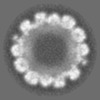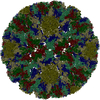+ Open data
Open data
- Basic information
Basic information
| Entry | Database: EMDB / ID: EMD-5182 | |||||||||
|---|---|---|---|---|---|---|---|---|---|---|
| Title | The structure of simian virus 40 virus-like particles | |||||||||
 Map data Map data | Cryo-EM based reconstruction of simian virus 40 virus-like particles | |||||||||
 Sample Sample |
| |||||||||
 Keywords Keywords | SV40 / simian virus 40 / virus-like particles | |||||||||
| Biological species |  avian polyomavirus avian polyomavirus | |||||||||
| Method | single particle reconstruction / cryo EM / Resolution: 13.8 Å | |||||||||
 Authors Authors | Shen PS / Enderlein D / Nelson C / Carter WS / Kawano M / Xing L / Swenson RD / Olson NH / Baker TS / Cheng RH ...Shen PS / Enderlein D / Nelson C / Carter WS / Kawano M / Xing L / Swenson RD / Olson NH / Baker TS / Cheng RH / Atwood WJ / Johne R / Belnap DM | |||||||||
 Citation Citation |  Journal: Virology / Year: 2011 Journal: Virology / Year: 2011Title: The structure of avian polyomavirus reveals variably sized capsids, non-conserved inter-capsomere interactions, and a possible location of the minor capsid protein VP4. Authors: Peter S Shen / Dirk Enderlein / Christian D S Nelson / Weston S Carter / Masaaki Kawano / Li Xing / Robert D Swenson / Norman H Olson / Timothy S Baker / R Holland Cheng / Walter J Atwood / ...Authors: Peter S Shen / Dirk Enderlein / Christian D S Nelson / Weston S Carter / Masaaki Kawano / Li Xing / Robert D Swenson / Norman H Olson / Timothy S Baker / R Holland Cheng / Walter J Atwood / Reimar Johne / David M Belnap /  Abstract: Avian polyomavirus (APV) causes a fatal, multi-organ disease among several bird species. Using cryogenic electron microscopy and other biochemical techniques, we investigated the structure of APV and ...Avian polyomavirus (APV) causes a fatal, multi-organ disease among several bird species. Using cryogenic electron microscopy and other biochemical techniques, we investigated the structure of APV and compared it to that of mammalian polyomaviruses, particularly JC polyomavirus and simian virus 40. The structure of the pentameric major capsid protein (VP1) is mostly conserved; however, APV VP1 has a unique, truncated C-terminus that eliminates an intercapsomere-connecting β-hairpin observed in other polyomaviruses. We postulate that the terminal β-hairpin locks other polyomavirus capsids in a stable conformation and that absence of the hairpin leads to the observed capsid size variation in APV. Plug-like density features were observed at the base of the VP1 pentamers, consistent with the known location of minor capsid proteins VP2 and VP3. However, the plug density is more prominent in APV and may include VP4, a minor capsid protein unique to bird polyomaviruses. | |||||||||
| History |
|
- Structure visualization
Structure visualization
| Movie |
 Movie viewer Movie viewer |
|---|---|
| Structure viewer | EM map:  SurfView SurfView Molmil Molmil Jmol/JSmol Jmol/JSmol |
| Supplemental images |
- Downloads & links
Downloads & links
-EMDB archive
| Map data |  emd_5182.map.gz emd_5182.map.gz | 91.4 MB |  EMDB map data format EMDB map data format | |
|---|---|---|---|---|
| Header (meta data) |  emd-5182-v30.xml emd-5182-v30.xml emd-5182.xml emd-5182.xml | 11.4 KB 11.4 KB | Display Display |  EMDB header EMDB header |
| Images |  emd_5182_1.jpg emd_5182_1.jpg | 39.2 KB | ||
| Archive directory |  http://ftp.pdbj.org/pub/emdb/structures/EMD-5182 http://ftp.pdbj.org/pub/emdb/structures/EMD-5182 ftp://ftp.pdbj.org/pub/emdb/structures/EMD-5182 ftp://ftp.pdbj.org/pub/emdb/structures/EMD-5182 | HTTPS FTP |
-Related structure data
| Related structure data |  5180C  5181C  5183C  5184C  5187C 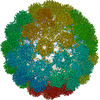 3iysC C: citing same article ( |
|---|---|
| Similar structure data |
- Links
Links
| EMDB pages |  EMDB (EBI/PDBe) / EMDB (EBI/PDBe) /  EMDataResource EMDataResource |
|---|
- Map
Map
| File |  Download / File: emd_5182.map.gz / Format: CCP4 / Size: 184.1 MB / Type: IMAGE STORED AS FLOATING POINT NUMBER (4 BYTES) Download / File: emd_5182.map.gz / Format: CCP4 / Size: 184.1 MB / Type: IMAGE STORED AS FLOATING POINT NUMBER (4 BYTES) | ||||||||||||||||||||||||||||||||||||||||||||||||||||||||||||||||||||
|---|---|---|---|---|---|---|---|---|---|---|---|---|---|---|---|---|---|---|---|---|---|---|---|---|---|---|---|---|---|---|---|---|---|---|---|---|---|---|---|---|---|---|---|---|---|---|---|---|---|---|---|---|---|---|---|---|---|---|---|---|---|---|---|---|---|---|---|---|---|
| Annotation | Cryo-EM based reconstruction of simian virus 40 virus-like particles | ||||||||||||||||||||||||||||||||||||||||||||||||||||||||||||||||||||
| Projections & slices | Image control
Images are generated by Spider. | ||||||||||||||||||||||||||||||||||||||||||||||||||||||||||||||||||||
| Voxel size | X=Y=Z: 1.61 Å | ||||||||||||||||||||||||||||||||||||||||||||||||||||||||||||||||||||
| Density |
| ||||||||||||||||||||||||||||||||||||||||||||||||||||||||||||||||||||
| Symmetry | Space group: 1 | ||||||||||||||||||||||||||||||||||||||||||||||||||||||||||||||||||||
| Details | EMDB XML:
CCP4 map header:
| ||||||||||||||||||||||||||||||||||||||||||||||||||||||||||||||||||||
-Supplemental data
- Sample components
Sample components
-Entire : simian virus 40 virus-like particles
| Entire | Name: simian virus 40 virus-like particles |
|---|---|
| Components |
|
-Supramolecule #1000: simian virus 40 virus-like particles
| Supramolecule | Name: simian virus 40 virus-like particles / type: sample / ID: 1000 / Oligomeric state: virions / Number unique components: 1 |
|---|
-Supramolecule #1: avian polyomavirus
| Supramolecule | Name: avian polyomavirus / type: virus / ID: 1 / Name.synonym: avian polyomavirus / Details: Cryo-EM of simian virus 40 over holey carbon grids / Sci species name: avian polyomavirus / Database: NCBI / Virus type: VIRION / Virus isolate: STRAIN / Virus enveloped: No / Virus empty: Yes / Syn species name: avian polyomavirus |
|---|---|
| Host (natural) | synonym: VERTEBRATES |
| Virus shell | Shell ID: 1 / Name: VP1 / Diameter: 5000 Å / T number (triangulation number): 7 |
-Experimental details
-Structure determination
| Method | cryo EM |
|---|---|
 Processing Processing | single particle reconstruction |
| Aggregation state | particle |
- Sample preparation
Sample preparation
| Concentration | 1.5 mg/mL |
|---|---|
| Buffer | pH: 7.6 / Details: 20 mM Tris-Cl (pH 7.9) and 50 mM NaCl |
| Grid | Details: 200 mesh copper grid (holey carbon) |
| Vitrification | Cryogen name: ETHANE / Chamber humidity: 100 % / Chamber temperature: 89 K / Instrument: OTHER Details: Vitrification instrument: Vitrobot. vitrification carried out in nitrogen atmosphere Method: 4 second blot before plunging |
- Electron microscopy
Electron microscopy
| Microscope | FEI TECNAI F30 |
|---|---|
| Temperature | Min: 88 K / Max: 95 K / Average: 90 K |
| Alignment procedure | Legacy - Astigmatism: astigmatism was corrected at 59,000 times magnification |
| Date | Jan 23, 2010 |
| Image recording | Category: FILM / Film or detector model: KODAK SO-163 FILM / Digitization - Scanner: NIKON SUPER COOLSCAN 9000 / Digitization - Sampling interval: 6.35 µm / Number real images: 50 / Details: Micrographs digitized in positive contrast mode. / Bits/pixel: 16 |
| Electron beam | Acceleration voltage: 200 kV / Electron source:  FIELD EMISSION GUN FIELD EMISSION GUN |
| Electron optics | Calibrated magnification: 39000 / Illumination mode: FLOOD BEAM / Imaging mode: BRIGHT FIELD / Cs: 2 mm / Nominal defocus max: 3.5 µm / Nominal defocus min: 0.5 µm / Nominal magnification: 39000 |
| Sample stage | Specimen holder: Side entry liquid nitrogen-cooled cryo specimen holder Specimen holder model: GATAN LIQUID NITROGEN |
| Experimental equipment | 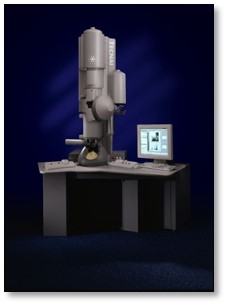 Model: Tecnai F30 / Image courtesy: FEI Company |
- Image processing
Image processing
| CTF correction | Details: each micrograph |
|---|---|
| Final reconstruction | Algorithm: OTHER / Resolution.type: BY AUTHOR / Resolution: 13.8 Å / Resolution method: FSC 0.33 CUT-OFF / Software - Name: PFT2 and EM3DR2 |
-Atomic model buiding 1
| Initial model | PDB ID: |
|---|---|
| Software | Name:  UCSF Chimera UCSF Chimera |
| Details | Protocol: rigid body. Coordinates were fitted by rigid-body fitting using UCSF Chimera |
| Refinement | Space: REAL / Protocol: RIGID BODY FIT / Overall B value: 20 / Target criteria: R-factor |
 Movie
Movie Controller
Controller



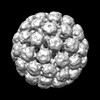




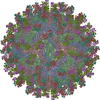





 Z (Sec.)
Z (Sec.) Y (Row.)
Y (Row.) X (Col.)
X (Col.)










